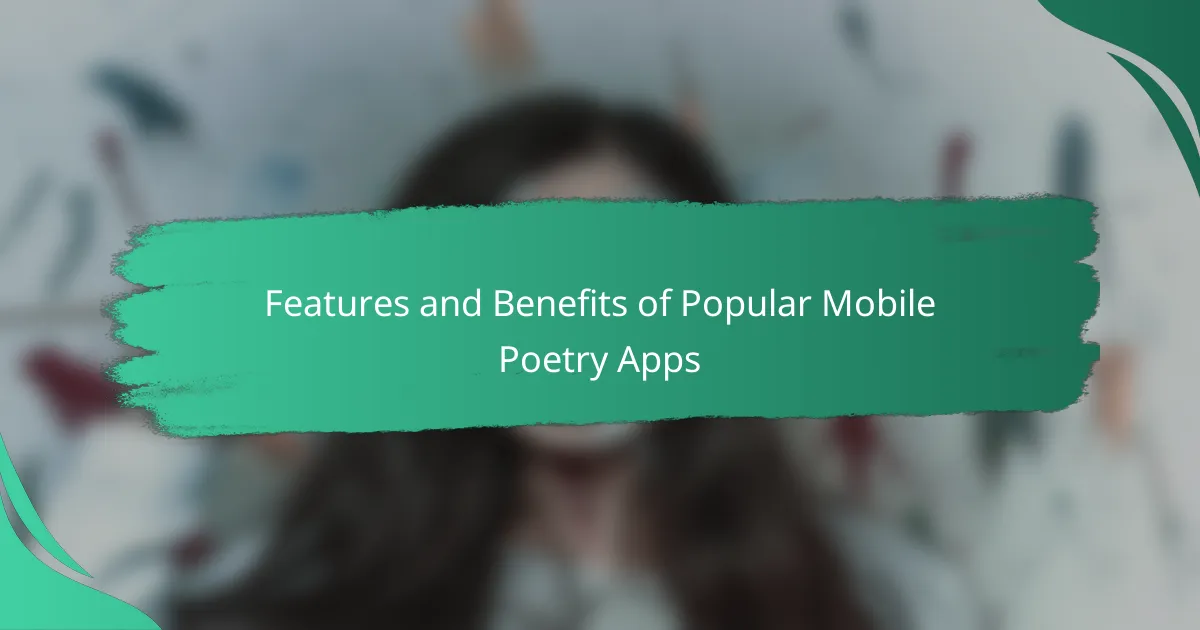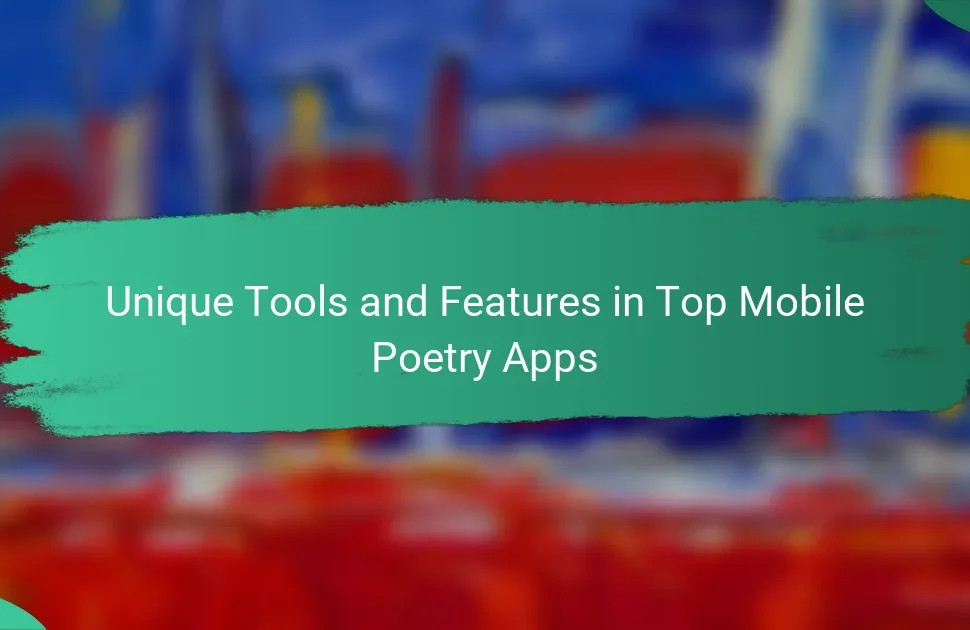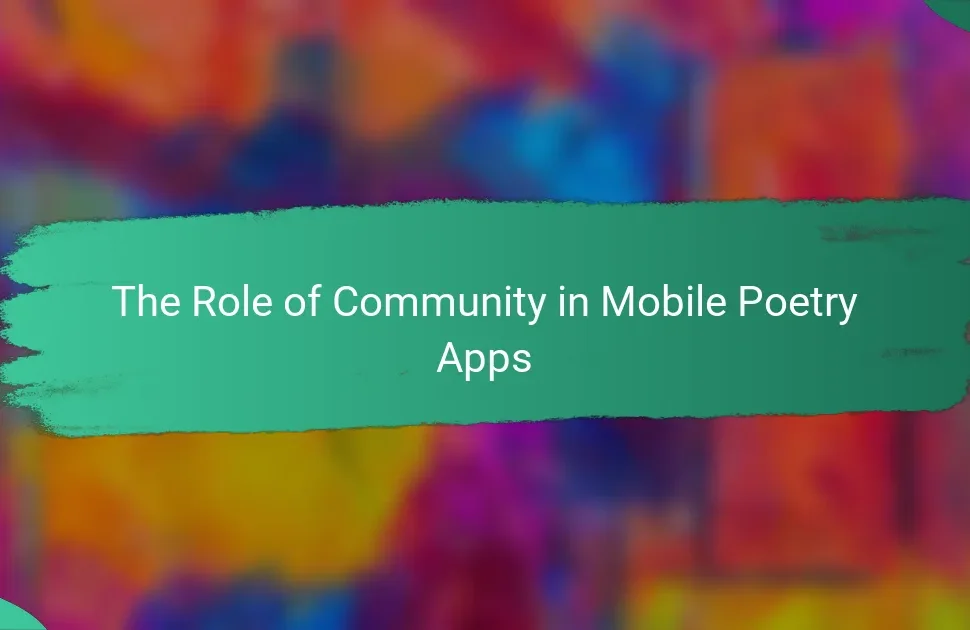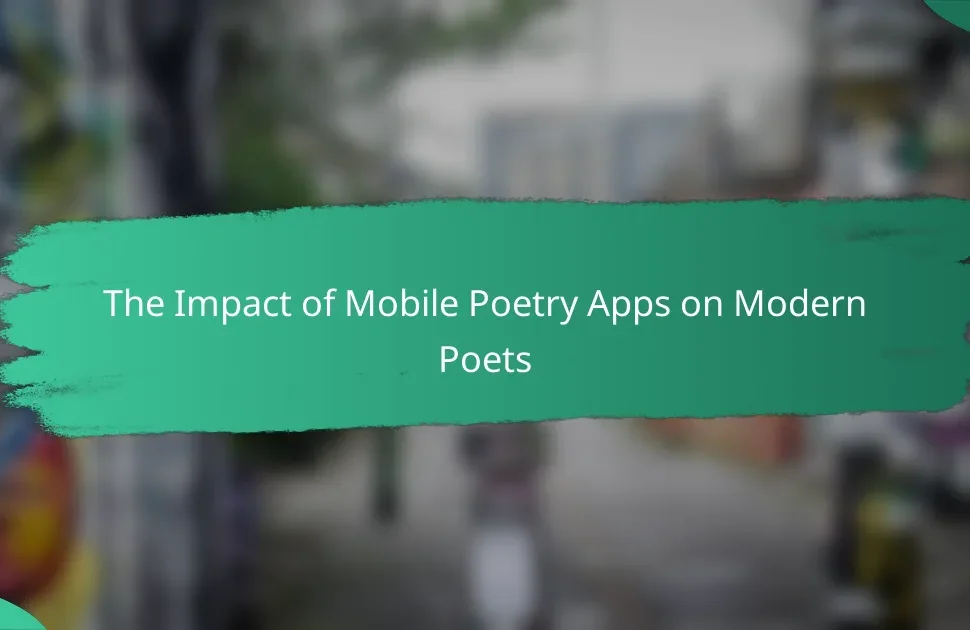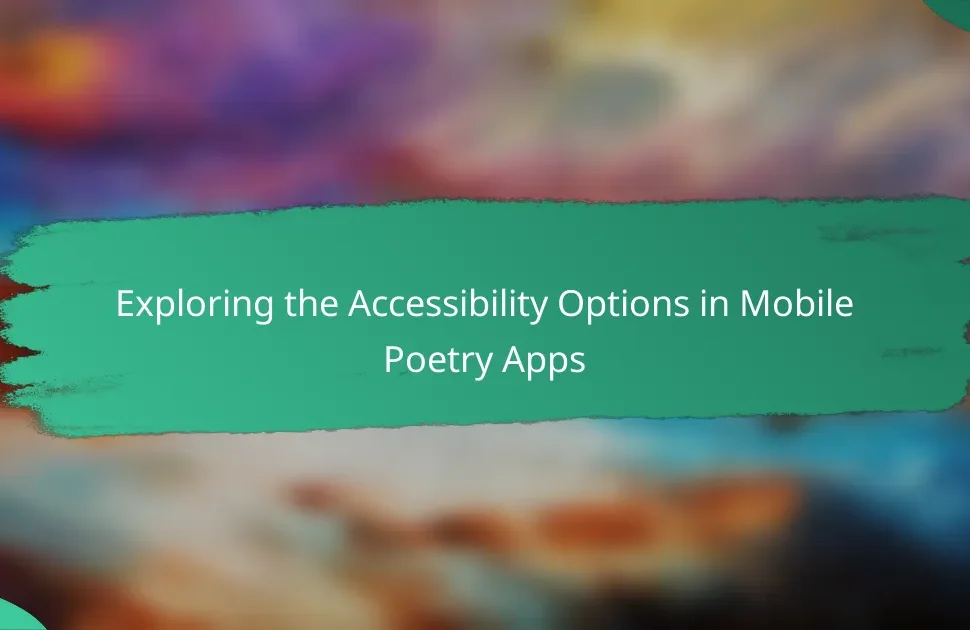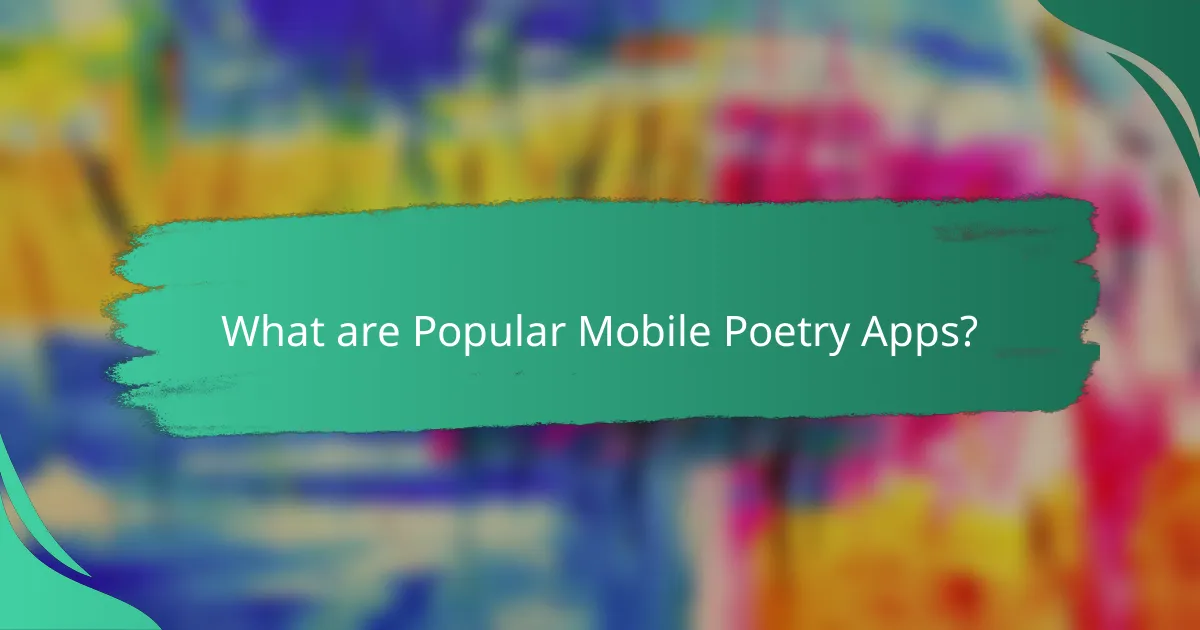
What are Popular Mobile Poetry Apps?
Popular mobile poetry apps include Poetizer, Poetizer is a social network for poets. It allows users to share their work and connect with others. Another popular app is Rhymer’s Block. This app helps users create rhymes and develop their poetry. Additionally, there is the app called Verse. Verse offers writing prompts and a community for sharing poetry. Each of these apps provides unique features that cater to poetry enthusiasts. They enable creativity and collaboration among users.
How do Popular Mobile Poetry Apps differ from traditional poetry platforms?
Popular mobile poetry apps differ from traditional poetry platforms primarily in accessibility and user engagement. Mobile apps allow users to create, share, and discover poetry on-the-go. This contrasts with traditional platforms that often require a desktop or specific software. Mobile apps typically feature interactive elements, such as audio recordings and visual art integration. Traditional platforms usually focus on text-based content without these enhancements. Additionally, mobile apps often include social features, enabling users to connect and collaborate easily. In contrast, traditional platforms may lack real-time interaction capabilities. These differences highlight the adaptability and user-centric design of mobile poetry apps compared to their traditional counterparts.
What unique features do these apps offer to poets?
Mobile poetry apps offer unique features tailored for poets. These features include writing prompts to inspire creativity. They often have community forums for sharing and feedback. Many apps provide tools for organizing poems by themes or collections. Some apps include audio recording for spoken word poetry. Others offer collaboration options with fellow poets. Certain apps feature analytics to track writing habits and progress. Additionally, customizable formatting options enhance the presentation of poems. These unique features cater specifically to the needs of poets, fostering creativity and community engagement.
How do user interfaces enhance the poetry creation experience?
User interfaces enhance the poetry creation experience by providing intuitive tools and streamlined workflows. These interfaces allow users to easily navigate through features like rhyme suggestions and formatting options. They often include visual elements that inspire creativity, such as background images and customizable themes. User-friendly design reduces friction, enabling poets to focus on their writing rather than technical challenges. Many mobile poetry apps offer real-time feedback, which helps users refine their work instantly. Research indicates that effective user interfaces can significantly improve user engagement and satisfaction in creative tasks. A study by Nielsen Norman Group shows that well-designed interfaces lead to higher productivity and creativity.
What benefits do users gain from using Popular Mobile Poetry Apps?
Users gain several benefits from using popular mobile poetry apps. These apps provide a platform for creative expression. They offer tools for writing, editing, and sharing poetry easily. Many apps include prompts to inspire users. They also facilitate community engagement through sharing and feedback. Users can discover new poets and styles within these apps. Mobile accessibility allows for writing on-the-go, enhancing convenience. Some apps feature audio options for listening to poetry, enriching the experience. Overall, these benefits promote creativity and connection in the poetry community.
How do these apps foster creativity and inspiration among poets?
Mobile poetry apps foster creativity and inspiration among poets through interactive features and community engagement. These apps provide prompts that stimulate poetic ideas. They often include tools for brainstorming and organizing thoughts. Many apps allow users to share their work for feedback. This feedback can motivate poets to refine their craft. Collaborative features enable poets to co-create and exchange ideas. Access to a vast library of poetry can inspire new styles and forms. Overall, these elements create an environment conducive to creative expression.
What community features do these apps provide for collaboration?
Mobile poetry apps provide several community features for collaboration. These features include shared writing spaces. Users can co-create poems in real-time. Many apps offer feedback systems for peer reviews. Users can comment on each other’s work, fostering discussion. Some apps host community challenges to inspire creativity. Others include forums for sharing tips and techniques. Notifications alert users to new collaborations or comments. These features enhance user engagement and promote a collaborative environment.
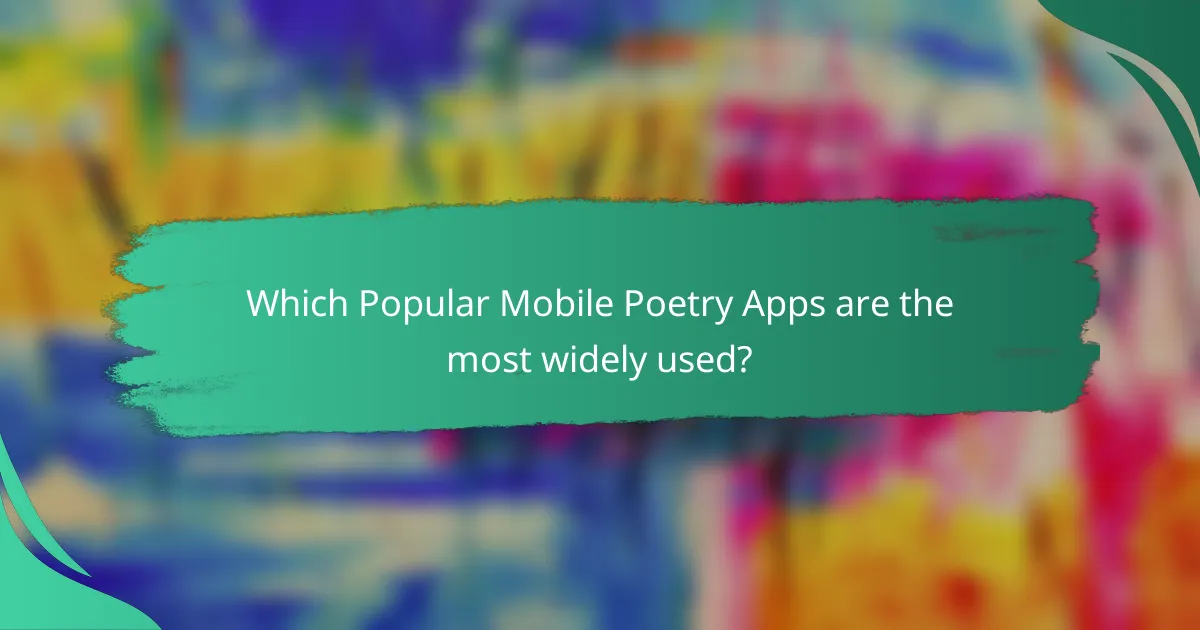
Which Popular Mobile Poetry Apps are the most widely used?
The most widely used mobile poetry apps include Poetizer, Verse, and Poetry Foundation. Poetizer offers a social platform for poets to share their work. It has over 100,000 downloads on Android. Verse provides tools for writing and sharing poetry with a user-friendly interface. Poetry Foundation features a vast collection of poems and resources. These apps cater to a growing community of poetry enthusiasts. Their popularity is reflected in user ratings and download statistics.
What are the top-rated mobile poetry apps available today?
The top-rated mobile poetry apps available today include Poetizer, The Poetry App, and Instant Poetry. Poetizer allows users to share and discover poetry within a community. The Poetry App offers a vast collection of classic and contemporary poems. Instant Poetry enables users to create poems by mixing words from a curated selection. These apps have received high ratings for their user-friendly interfaces and engaging features. Poetizer has a community of over 100,000 users. The Poetry App features over 1 million poems. Instant Poetry is popular for its unique word mixing tool.
How do user reviews reflect the effectiveness of these apps?
User reviews reflect the effectiveness of mobile poetry apps by providing direct feedback from actual users. These reviews often highlight specific features that users find beneficial, such as ease of use and functionality. For example, a review may mention how an app’s user interface enhances the poetry writing experience. Additionally, users frequently share their personal experiences regarding the app’s impact on their creativity and productivity. Positive reviews can indicate that the app effectively meets user needs, while negative reviews may reveal shortcomings. Research shows that 70% of users rely on reviews to gauge app performance before downloading. Thus, user reviews serve as a valuable resource for assessing the overall effectiveness of these apps.
What specific features make these apps stand out?
Popular mobile poetry apps stand out due to their unique features. Notable features include user-friendly interfaces that enhance accessibility. Many apps offer personalized writing prompts to inspire creativity. Social sharing options allow users to connect with fellow poets. Some apps provide multimedia support, enabling users to incorporate images and audio. Advanced editing tools help refine poetry with ease. Community engagement features foster collaboration and feedback among users. Analytics tools track writing progress and engagement, motivating users to write more frequently.
What are the unique attributes of each popular mobile poetry app?
It is not possible to provide a definitive answer to the question about the unique attributes of each popular mobile poetry app. The specific attributes of these apps can vary widely and are subject to frequent updates and changes. Additionally, a comprehensive list of all popular mobile poetry apps and their unique attributes would require extensive research and current data that is not readily available.
How does each app cater to different types of poets?
Different poetry apps cater to various types of poets by offering tailored features and functionalities. For example, Poetizer focuses on community engagement, allowing poets to share and critique each other’s work. This social aspect appeals to collaborative poets seeking feedback. In contrast, the app called Poet Assistant provides writing prompts and rhyming dictionaries, serving poets who need inspiration and technical support. Another app, Verse, emphasizes multimedia integration, enabling poets to combine text with audio and visuals, attracting those interested in performance poetry. Each app’s unique features address specific needs, enhancing the creative process for diverse poetic styles.
What are the pricing models for these apps, and how do they compare?
The pricing models for popular mobile poetry apps include free, freemium, and subscription-based models. Free apps offer basic features at no cost. Freemium models provide free access with optional paid features or content. Subscription-based apps charge a recurring fee for full access to all features.
For example, some apps may offer a monthly subscription of $4.99. Others may have an annual plan costing $49.99. This allows users to save money compared to monthly payments.
In comparison, free apps may generate revenue through ads. Freemium apps rely on users upgrading for additional features. Subscription models ensure steady income for developers.
Overall, the choice of pricing model affects user experience and revenue generation. Each model has its advantages and caters to different user preferences.
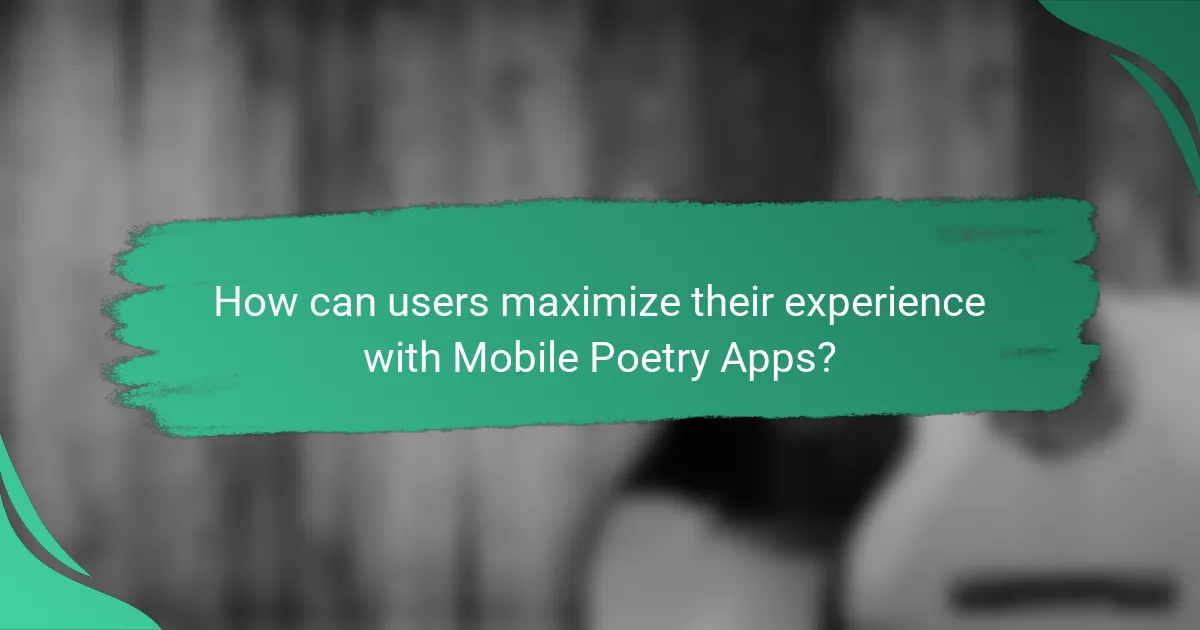
How can users maximize their experience with Mobile Poetry Apps?
Users can maximize their experience with Mobile Poetry Apps by exploring all available features. Engaging with interactive tools enhances creativity and expression. Many apps offer writing prompts that inspire new poetic ideas. Users should utilize community features to share their work and receive feedback. Reading poetry from other users can provide new perspectives and inspiration. Customizing the app settings can improve usability and personal experience. Regularly updating the app ensures access to the latest features and improvements. Participating in challenges can motivate users to write more frequently.
What tips can enhance the poetry writing process using these apps?
Utilizing mobile poetry apps can significantly enhance the poetry writing process. First, take advantage of built-in prompts to inspire creativity. These prompts can help overcome writer’s block. Next, use the rhyme and thesaurus features to enrich vocabulary. This allows for more expressive language. Additionally, utilize the editing tools to refine your work. These tools help in polishing poems for clarity and impact. Lastly, engage with community features for feedback. Receiving constructive criticism can lead to improvement in writing skills.
How can users engage with the community features effectively?
Users can engage with community features effectively by actively participating in discussions and sharing their work. Regularly commenting on others’ posts fosters connections and encourages feedback. Joining themed challenges or prompts can enhance creativity and interaction. Utilizing private messaging for deeper conversations builds relationships. Attending virtual events or workshops offered by the app promotes community involvement. Following other users allows for a personalized content feed, enhancing engagement. Notifications for community activities keep users informed and active. Engaging with community features can lead to increased visibility and support for one’s poetry.
What best practices should users follow for sharing their work?
Users should follow several best practices for sharing their work effectively. First, ensure that the content is polished and free of errors. Quality presentation enhances credibility. Second, choose the right platform for sharing. Each platform has its audience and format preferences. Third, engage with the audience by responding to comments and feedback. This interaction builds a community around the work. Fourth, use relevant hashtags to increase visibility. Hashtags help users discover new content. Fifth, share work consistently but avoid overwhelming followers. Regular updates keep the audience engaged without causing fatigue. Finally, respect copyright and give credit when referencing others’ work. This practice fosters a respectful sharing environment.
What common troubleshooting tips exist for Mobile Poetry Apps?
Common troubleshooting tips for mobile poetry apps include checking for app updates. Ensure the app is updated to the latest version for optimal performance. Restarting the app can resolve minor glitches. If the app crashes, closing and reopening it often helps. Clearing the app cache may improve functionality. Users should also check their device storage space, as low storage can affect app performance. Ensuring a stable internet connection is crucial for apps that require online features. Finally, reinstalling the app can fix persistent issues. These steps are widely recognized among users for resolving common problems with mobile poetry apps.
The main entity of the article is popular mobile poetry apps, which provide various features and benefits for poetry enthusiasts. The article explores key apps such as Poetizer, Rhymer’s Block, and Verse, highlighting their unique functionalities, community engagement tools, and user-friendly interfaces that enhance the poetry creation experience. It also examines how these apps differ from traditional poetry platforms, the benefits they offer, and tips for maximizing user experience. Additionally, the article discusses pricing models, user reviews, and best practices for sharing poetry within these mobile platforms.
